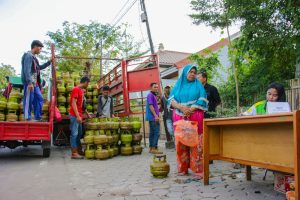by: Hartatik
Jakarta – Civil society groups support the government’s policy to lift the moratorium on the export of crude palm oil (CPO) or the raw material for cooking oil and also for biofuel. The policy is considered to be able to affect the price of oil palm fresh fruit bunches (FFB), especially at the independent smallholder level.
“The lifting of the moratorium can reduce the potential for economic losses because the price of CPO is good and not all Indonesian CPO cannot be absorbed by the domestic market,” Traction Energy Asia Research Manager, Fariz Panghegar told tanahair.net, Saturday (20/5).
President Joko Widodo previously imposed an export ban on the export of cooking oil and its derivative products from April 28. However, the president lifted the ban so that exports of cooking oil and other raw materials will resume effectively from 23 May.
“Based on the current supply and price of cooking oil, and considering that there are 17 million workers in the palm oil industry, both farmers, workers, and other supporting staff, I have decided that cooking oil exports will reopen on Monday, May 23, 2022,” said Jokowi. in an official statement broadcast on the Presidential Secretariat’s YouTube channel, Thursday (19/5).
Alternative sources
Panghegar said that although lifting of the palm oil moratorium could have an impact on the expansion of oil palm plantations, land intensification by replanting can increase in FFB yields without expanding the land, thus avoiding deforestation. However, replanting currently has not been maximised.
The Palm Oil Plantation Fund Management Agency (BPDPKS) is only targeting to replant 180 thousand hectares per year and that is not yet maximised. If land intensification is not achieved, Panghegar said, the government must make a choice between reducing CPO exports or the CPO biodiesel mix, in order to be able to meet the quota without opening new land.
“If the government is reluctant to reduce exports and biodiesel mix, they must start exploring alternative raw material options for biodiesel, such as used cooking oil (UCO),” he added.
Indonesia has the potential for UCO of approximately 1.2 million kilolitres from households and micro business units. With this potential, UCO is able to meet 10% of the demand for biodiesel raw materials.
“Obviously if we can take UCO from hotels, restaurants, cafes and the medium and large scale food industry, the potential will be even greater,” said Panghegar.
He said the CPO moratorium policy shows that the government is not ready to face market dynamics. Because currently there is no regulation that regulates CPO as a food commodity, energy and also as an export commodity which is a source of foreign exchange for the country.
Oil palm market structure
Oil Palm Farmers Union (Serikat Petani Kelapa Sawit, SPKS) Secretary General Mansuetus Darto said the structure of the palm oil market consists of five networks. The largest network are traders, or those who own oil palm plantations and factories, exporters, buy CPO from other parties as well, and have refineries in the country (for cooking oil, biodiesel) and even abroad. This network dominates the market.
The rest of the networks consists of manufacturers; growers or oil palm plantation companies; smallholders who partner with palm oil companies or also known as plasma smallholders; and independent smallholders.
“With this structure, of course, it’s unfair. The palm oil oligarchy dominates the first link (network). They control the industry upstream and downstream. They all have their business infrastructure in place,” said Darto to tanahair.net.
“The oil palm oligarchy is getting stronger and they are able to develop their massive biodiesel factories because of incentives from the export levies provided by the government,” he said.
Darto said that if the production of cooking oil and biodiesel are managed domestically and raw materials are sourced from oil palm farmers, he believed that farmers will not be affected by the ban on the export of CPO and its derivatives.
Banner photo: Suwit Ngaokaew/shutterstock.com














